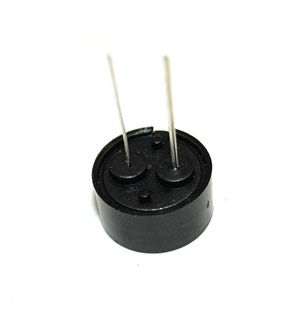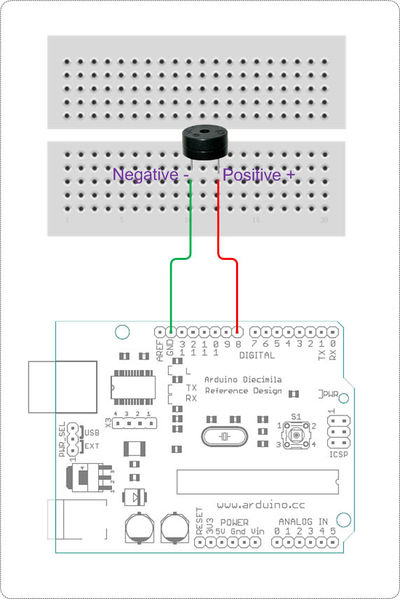Difference between revisions of "Buzzer"
Katherine.d (talk | contribs) (→Introduction) |
Yajuan.dai (talk | contribs) (→Introduction) |
||
| (2 intermediate revisions by one other user not shown) | |||
| Line 5: | Line 5: | ||
Typical uses include alarm devices, timers and confirmation of user input such as a mouse click or keystroke. | Typical uses include alarm devices, timers and confirmation of user input such as a mouse click or keystroke. | ||
| − | [[File:buzzer 1.jpg | | + | [[File:buzzer 1.jpg | 300px]] |
| − | |||
| + | ===Adjustable coupling=== | ||
| + | **[http://linksprite.com/wiki/index.php5?title=Sensors_Pack_for_Arduino Sensors Pack for Arduino] [KIT_SENPACK] | ||
| + | |||
| + | == Example Project == | ||
| + | |||
| + | === Hardware Preparation === | ||
| + | |||
*Arduino Duemilanove or Compatible Arduino Controller (1 unit) | *Arduino Duemilanove or Compatible Arduino Controller (1 unit) | ||
*Buzzer (1 unit) | *Buzzer (1 unit) | ||
| Line 15: | Line 21: | ||
*Jumper Cables (2 units) | *Jumper Cables (2 units) | ||
| − | |||
[[File:buzzer.jpg | 400px]] | [[File:buzzer.jpg | 400px]] | ||
| − | == | + | === Programming === |
<syntaxhighlight lang="c"> | <syntaxhighlight lang="c"> | ||
//For Arduino Start kit | //For Arduino Start kit | ||
Latest revision as of 10:27, 19 August 2014
Contents
Introduction
A piezoelectric buzzer is an audio signalling device. A sample piezoelectric buzzer is shown below.
Typical uses include alarm devices, timers and confirmation of user input such as a mouse click or keystroke.
Adjustable coupling
- Sensors Pack for Arduino [KIT_SENPACK]
Example Project
Hardware Preparation
- Arduino Duemilanove or Compatible Arduino Controller (1 unit)
- Buzzer (1 unit)
- Prototyping Shield (1 unit)
- Mini Breadboard (1 unit)
- Jumper Cables (2 units)
Programming
<syntaxhighlight lang="c"> //For Arduino Start kit //Compatible with all Arduino version // //
int buzzer=8;//Connect the buzz positive Pin to Digital Pin 8 void setup() {
pinMode(buzzer,OUTPUT);//Set Pin Mode as output
} void loop() {
unsigned char i,j;
while(1)
{
for(i=0;i<80;i++) //Sound effect 1
{
digitalWrite(buzzer,HIGH);//Make some sound
delay(1);//Delay 1ms
digitalWrite(buzzer,LOW);//Be quiet
delay(1);//Delay 1ms
}
for(i=0;i<100;i++) //Sound effect 2
{
digitalWrite(buzzer,HIGH);//Make some sound
delay(2);//Delay 2ms
digitalWrite(buzzer,LOW);//Be quiet
delay(2);//Delay 2ms
}
}
} </syntaxhighlight>

